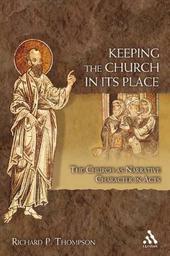
|
Keeping the Church in Its Place: The Church as Narrative Character in Acts
Paperback / softback
Main Details
| Title |
Keeping the Church in Its Place: The Church as Narrative Character in Acts
|
| Authors and Contributors |
By (author) Dr. Richard P. Thompson
|
| Physical Properties |
| Format:Paperback / softback | | Pages:320 |
|
| Category/Genre | Biblical studies |
|---|
| ISBN/Barcode |
9780567026453
|
| Classifications | Dewey:226.6 |
|---|
| Audience | |
|---|
|
Publishing Details |
| Publisher |
Bloomsbury Publishing PLC
|
| Imprint |
T.& T.Clark Ltd
|
| Publication Date |
15 January 2007 |
| Publication Country |
United Kingdom
|
Description
Thompson's study offers a fresh reading of Acts that keeps the church within its literary place within that narrative. His study uncovers descriptions of the church that emphasize certain characteristics presented in the opening scenes of the narrative: the blessing and presence of God, the unanimity of the believers, the communal caring for one another, and the proclamation of the gospel. The progression of the Acts narrative presents an evolving image of the church that eventually includes both Jewish and non-Jewish believers of the gospel, with growing opposition from the Jewish people and even from the Jewish believers in Jerusalem. This dynamic portrait of the church in the book of Acts contrasts three different views concerning "the people of God": the Jewish people as the historical people of God, Jewish believers as represented by the Jerusalem church, and the church that includes both Jews and Gentiles. By offering such a dynamic narrative of these various groups of believers, Acts encourages readers to defien and identify the church or Christian community as the people who belong to God rather than those whose identity as God's people is based on historical or religious categories.
Author Biography
Richard P. Thompson is Professor of Greek and New Testament Studies at Spring Arbor University in Spring Arbor, Michigan and co-editor of Literary Studies in Luke-Acts.
Reviews"Thompson has provided an important work on narrative characterization, and his argument for the centrality of the church as a central character in the narrative of Acts is overall quite convincing. His narrative dialectic between the individual and corporate aspects of this characterization provides a much-needed balance with regard to readings of the NT that only focus on the corporate nature of these documents. Overall, the book is engaging and provides a good example of how narrative criticism may be applied to a NT document." -J. Brian Tucker, Bulletin for Biblical Research 19.1 "Thompson seeks to show the continuity of these qualities throughout Acts. His is doubtless correct...Keeping throws the light of narrative criticism on one dimension of Acts: the believers as a collective character." -Richard I. Pervo, Journal of Religion, April 2008
|